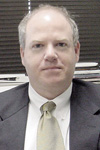NASHVILLE, Tenn. - Although he worked in a bureaucracy for several years, Dr. Robert Hoover is hardly an ivory tower pencil pusher. The former Region D medical director has made it his mission to be actively involved in the process of clinical care, examining how equipment and policies can converge to best serve Medicare beneficiaries.
After seven years at the Region D DMERC, Hoover began applying this approach last summer to his new position as senior vice president of global clinical services for Longmont, Colo.-based Sunrise Medical. Working at the headwaters of the supply chain presents Hoover with the opportunity to gain more knowledge about product efficacy and give him a platform to communicate more effectively with his physician peers, he said.
"I have always been an advocate for the medical equipment industry and want to expand that role into physician education," he said about his career move.
When he met with Sunrise CEO Mike Hammes about the newly created position, Hoover became intrigued about how he could put his clinical expertise to better use.
"Not that Sunrise didn't have good clinical people, but the company is seen as a manufacturer and one of the things Mike and I talked about was differentiating Sunrise," he said. "They had addressed quality but were looking for that missing piece."
A native of Mobile, Ala., and graduate of the University of South Alabama, Hoover received his clinical training in internal medicine at Nashville's Vanderbilt University. Though he served as a practicing clinician, he discovered an affinity for administration and became medical director for the state of Tennessee, overseeing operations at one of the state's hospitals.
"I ran the lab, radiology and infection control and had to be familiar with Joint Commission standards," he said. "I got a feel for what it was like to run a hospital from a clinical and administrative standpoint."
He later pursued a master's degree in public health from the Medical College of Wisconsin at Milwaukee and was hired as the Region D medical director in 1998. Before taking that job at Cigna in Nashville, Hoover said, he knew very little about the HME industry.
"Other than filling out CMNs, it wasn't something I paid much attention to," he said. "I can tell you, however, that my decisions about which companies got my referrals were based on service. I had one respiratory supplier who would deliver whenever I called and he got all my business."
As medical director for Region D, Hoover said, he took several factors into consideration when evaluating products, most notably what he called the "five rights": right product, right place, right time, right patient, right cost. And contrary to the common perception about medical directors, Hoover said, he looked for a reason to cover, not deny, a product. During many of his evaluations, however, he became frustrated by a lack of information and that served as an impetus for his move from the payer side to the supply side.
"As I tried to make an evidence-based decision on coverage, I looked for outcomes and clinical data and in many cases did not find good research or medical literature on the efficacy of these devices," he said. "Hopefully, in my new position I can use my clinical background to fill in those knowledge gaps so that my colleagues have what they need to make informed decisions."
Providers like Steve Vinci, general manager of Sacramento, Calif.-based Timberlake Homecare, say Hoover's addition is a huge plus for the industry.
"He has tried to do the right thing by the patient without encumbering our industry any more than necessary," said Vinci, past president of the California Association of Medical Product Suppliers. "He speaks in the language physicians understand, which should help get our message across."




Comments